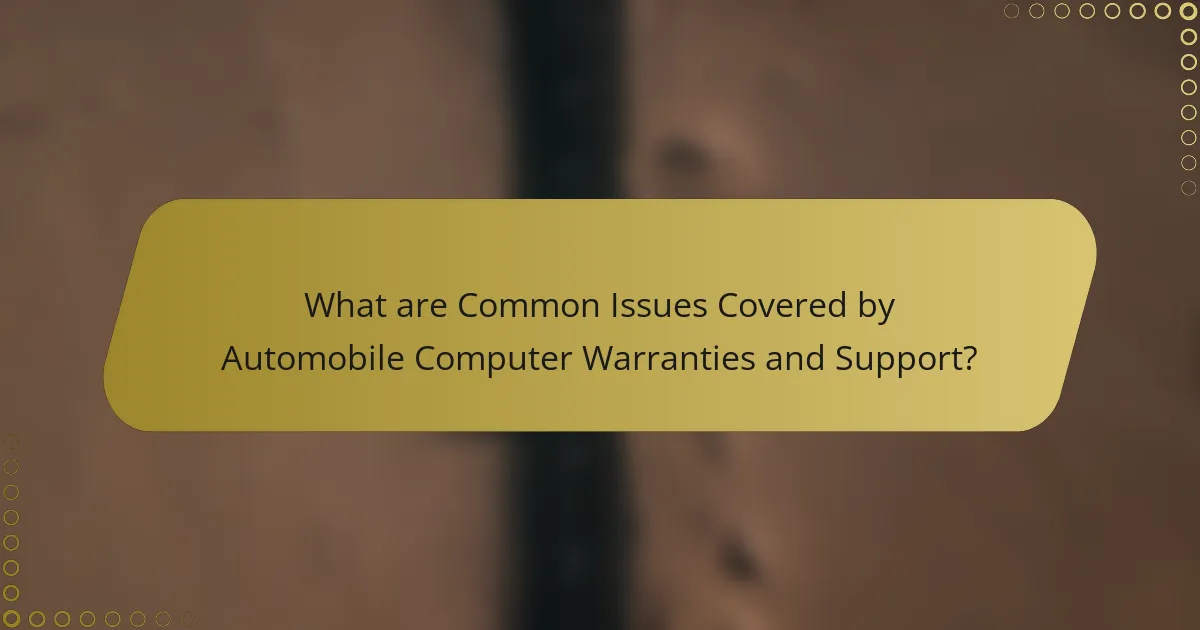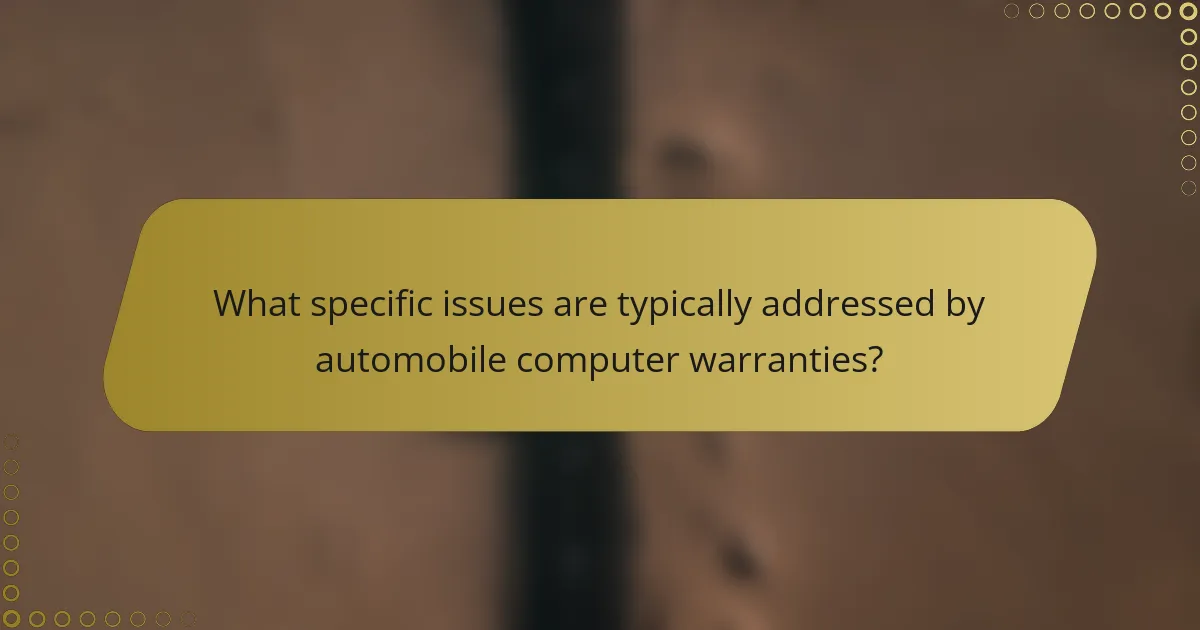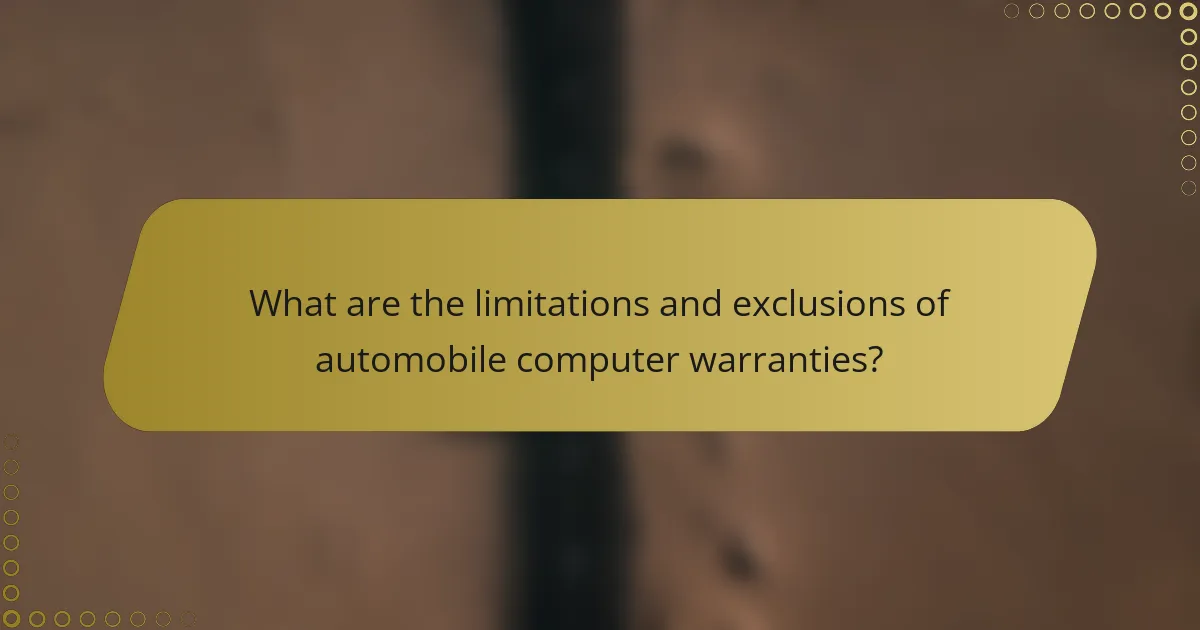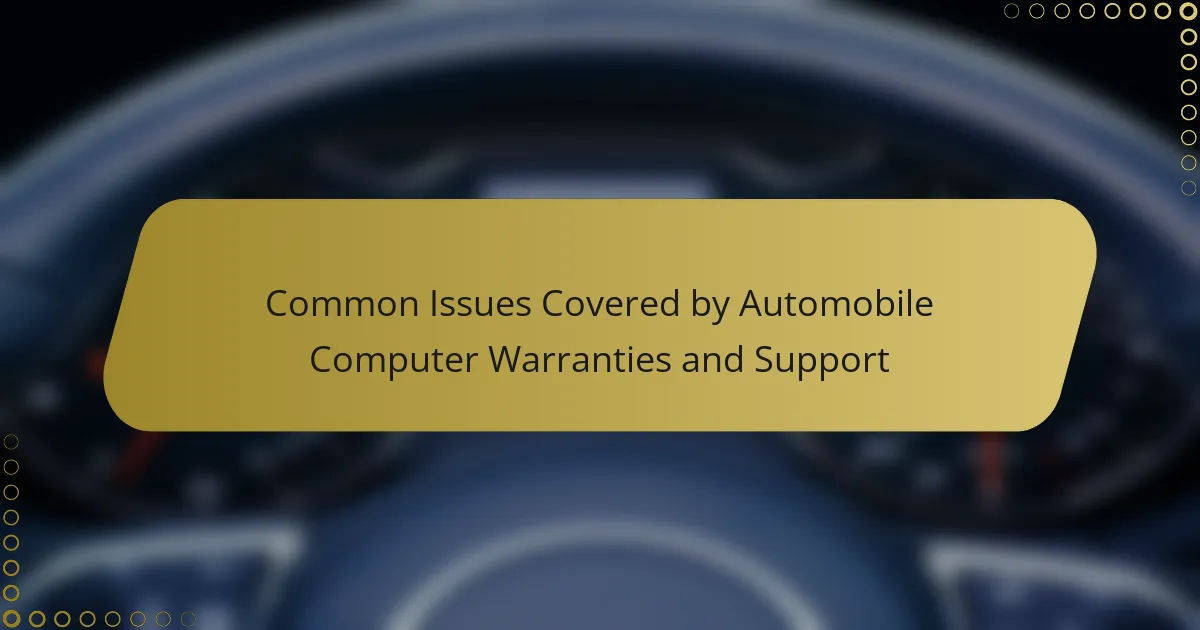Automobile computer warranties provide coverage for various electronic control units (ECUs) within vehicles, specifically addressing software malfunctions, hardware failures, and sensor errors. Key components affected include the engine control unit (ECU), transmission control module (TCM), and systems such as anti-lock brakes. These warranties typically encompass repairs or replacements for faulty parts, as well as troubleshooting support and necessary software updates. However, limitations and exclusions apply, including damage from accidents, misuse, and modifications, making it crucial for vehicle owners to thoroughly review warranty terms for specific coverage details.

What are Common Issues Covered by Automobile Computer Warranties and Support?
Common issues covered by automobile computer warranties and support include software malfunctions, hardware failures, and sensor errors. Software malfunctions can lead to problems with engine performance and diagnostics. Hardware failures often involve components like the engine control unit (ECU) or transmission control module (TCM). Sensor errors may affect systems such as anti-lock brakes or traction control. Warranties typically cover repairs or replacements for these issues. Support services may also provide troubleshooting assistance and software updates. This coverage ensures vehicles operate efficiently and safely.
How do automobile computer warranties provide coverage for vehicle issues?
Automobile computer warranties provide coverage for electronic and software-related vehicle issues. These warranties typically cover the vehicle’s onboard computer systems, including the engine control unit and transmission control module. Coverage often includes repairs or replacements for malfunctioning components. This can be due to defects in materials or workmanship. Many warranties also cover diagnostic services to identify issues related to the vehicle’s computer systems. Some warranties extend to software updates necessary for optimal vehicle performance. The specific terms of coverage can vary by manufacturer and warranty provider. However, comprehensive warranties generally aim to protect vehicle owners from high repair costs associated with electronic failures.
What types of vehicle systems are typically included in warranty coverage?
Vehicle systems typically included in warranty coverage are the powertrain, electrical system, and safety features. The powertrain includes the engine, transmission, and drivetrain components. The electrical system covers the battery, starter, and alternator. Safety features often encompass airbags, anti-lock braking systems, and traction control systems. Many warranties also extend to the suspension and steering components. These systems are critical for vehicle operation and safety, making them common inclusions in warranty policies.
How do warranties differ based on vehicle make and model?
Warranties differ based on vehicle make and model in terms of coverage duration and specific components included. Different manufacturers offer varying warranty lengths, typically ranging from three to ten years. Premium brands often provide longer warranties compared to economy brands. Coverage specifics also vary; some warranties may cover electronics, while others might exclude them. Additionally, certain models may have unique warranty provisions due to their design or technology. For instance, electric vehicles often include battery warranties that are distinct from traditional vehicle warranties. This variability is influenced by manufacturer policies and market competition.
Why is support important for resolving automobile computer issues?
Support is crucial for resolving automobile computer issues because it provides expert guidance and troubleshooting assistance. Automobile computer systems are complex and require specialized knowledge for effective diagnosis. Support services often include access to technical resources and diagnostic tools that are not available to the average consumer. Additionally, trained professionals can identify specific error codes and malfunctions that may not be apparent without proper training. Studies show that vehicles with professional support experience faster resolution times and improved reliability. This underscores the importance of having dedicated support to address and rectify computer-related problems in automobiles.
What are the most common computer-related problems in vehicles?
The most common computer-related problems in vehicles include software glitches, sensor malfunctions, and communication errors. Software glitches can cause issues with navigation systems and infotainment features. Sensor malfunctions often affect systems like anti-lock brakes and traction control. Communication errors may disrupt interactions between various vehicle systems, leading to performance issues. According to a study by the National Highway Traffic Safety Administration, electronic control unit failures are a significant concern in modern vehicles. These failures can lead to safety risks and costly repairs, highlighting the importance of warranties and support for vehicle computer systems.
How can proper support enhance the longevity of vehicle systems?
Proper support enhances the longevity of vehicle systems by ensuring timely maintenance and addressing issues before they escalate. Regular updates and diagnostics help identify potential failures early. Access to expert advice can guide owners on best practices for care. Warranty coverage often includes repairs and replacements for critical components. This reduces the financial burden of unexpected breakdowns. Studies show that vehicles with regular support services have increased lifespan and reliability. For instance, vehicles maintained under warranty often experience fewer major repairs over time.

What specific issues are typically addressed by automobile computer warranties?
Automobile computer warranties typically address issues related to the vehicle’s electronic control units (ECUs). These warranties cover malfunctions in systems such as engine control, transmission control, and anti-lock brakes. They often include repairs or replacements for faulty sensors and wiring harnesses. Additionally, warranties may cover software updates necessary for optimal performance. Some warranties also address issues with onboard diagnostics systems. Coverage can vary by provider, but most include labor costs associated with repairs. Specific terms and conditions apply, so it’s essential to review the warranty details.
How do warranties handle software-related issues in vehicles?
Warranties for vehicles typically cover software-related issues under specific terms. These warranties usually include provisions for software malfunctions that affect vehicle performance. For instance, if a vehicle’s infotainment system fails, the warranty may cover repairs or updates. Additionally, warranties may provide support for software updates that enhance functionality or fix bugs. However, coverage can vary by manufacturer and warranty type. It is essential for vehicle owners to review their warranty documents for specific details. Many manufacturers outline software-related issues explicitly in their warranty coverage. Understanding these terms helps owners know what to expect regarding support and repairs.
What are the common software malfunctions covered by warranties?
Common software malfunctions covered by warranties include system crashes and software bugs. These issues can lead to vehicle performance problems. Warranties typically cover failures caused by defective software. Additionally, warranty coverage may apply to compatibility issues with hardware. Some warranties also address security vulnerabilities in the software. These malfunctions can affect the vehicle’s functionality. Manufacturers often provide updates to fix these issues. Such updates are usually included under warranty terms.
How can software updates affect warranty coverage?
Software updates can impact warranty coverage by potentially voiding it if unauthorized modifications are made. Manufacturers often specify that using unapproved software can lead to warranty claims being denied. For example, if a vehicle’s software is altered to enhance performance, it may conflict with manufacturer specifications. This can result in the warranty being invalidated for related issues. Additionally, some manufacturers require that updates be performed by authorized service centers to maintain warranty coverage. Failure to adhere to these guidelines can lead to costly repairs not being covered under warranty.
What hardware issues are included in automobile computer warranties?
Automobile computer warranties typically cover hardware issues such as malfunctions of the engine control unit (ECU). They may also include failures in the powertrain control module (PCM). Other covered hardware issues often involve sensor failures, such as those related to the oxygen or mass airflow sensors. Warranties may extend to defects in wiring harnesses connected to the computer systems. Additionally, issues with onboard diagnostic systems are usually included. Coverage may vary by manufacturer, but these components are generally considered essential for vehicle operation.
Which components are most frequently covered under hardware warranties?
The components most frequently covered under hardware warranties include the central processing unit (CPU), memory (RAM), and hard drives. These components are essential for the functionality of computer systems. Warranties typically protect against defects in materials and workmanship. For example, if a CPU fails due to manufacturing defects, the warranty may cover its replacement. Similarly, if RAM malfunctions within the warranty period, it is often replaced at no cost. Hard drives are also commonly included, as they can fail due to various issues. Warranties help ensure that users receive support for these critical components.
How do manufacturers define hardware failure in warranty terms?
Manufacturers define hardware failure in warranty terms as a malfunction or defect in the physical components of a device. This includes failures that occur due to manufacturing defects or material issues. Hardware failures must typically prevent the device from functioning as intended. Manufacturers often specify that normal wear and tear or damage caused by misuse is not covered. Warranty terms may also outline specific conditions under which hardware failure is recognized. For example, failures occurring within a designated warranty period are usually eligible for coverage. This definition is supported by warranty documentation that outlines specific criteria for hardware failure claims.

What are the limitations and exclusions of automobile computer warranties?
Automobile computer warranties have specific limitations and exclusions. Common exclusions include damage from accidents, misuse, or improper installation. Warranties often do not cover software issues or updates. Environmental factors like extreme temperatures may also void warranty claims. Additionally, wear and tear from regular use is generally excluded. Modifications made to the vehicle can lead to warranty invalidation. Furthermore, many warranties have time limits or mileage restrictions. It’s essential to review the warranty terms for specific details on coverage.
What common exclusions should vehicle owners be aware of?
Common exclusions vehicle owners should be aware of include damage from accidents, misuse, or neglect. Warranties typically do not cover wear and tear on parts like brakes or tires. Additionally, modifications made to the vehicle may void warranty coverage. Environmental damage, such as flooding or hail, is often excluded. Routine maintenance and repairs are usually the owner’s responsibility. Warranty terms can vary significantly by provider and vehicle type. Always review the warranty documentation for specific exclusions. Understanding these exclusions can help owners avoid unexpected costs.
How do maintenance practices affect warranty validity?
Maintenance practices directly affect warranty validity by determining compliance with the manufacturer’s conditions. Many warranties require regular maintenance to uphold coverage. Failure to perform these maintenance tasks can lead to warranty voidance. For example, neglecting oil changes may result in engine damage, which would not be covered. Additionally, improper maintenance can create disputes over warranty claims. Manufacturers often specify maintenance intervals and procedures in the warranty documentation. Adhering to these guidelines is crucial for maintaining warranty protections. In conclusion, consistent and proper maintenance is essential to ensure warranty validity.
What are the consequences of unauthorized repairs on warranty coverage?
Unauthorized repairs typically void warranty coverage. This means that any issues arising from these repairs may not be covered by the manufacturer. Manufacturers often specify that only authorized service centers should perform repairs. Failure to adhere to this can lead to denial of warranty claims. In some cases, unauthorized repairs can cause further damage to the vehicle. This additional damage may result in costly repairs that the warranty would not cover. Consumers must be aware of their warranty terms. Understanding these terms can prevent unintended financial burdens.
How can vehicle owners maximize their warranty benefits?
Vehicle owners can maximize their warranty benefits by understanding the terms and conditions of their warranty. They should keep detailed records of all maintenance and repairs performed on the vehicle. Regular maintenance helps ensure that any warranty claims are valid. Owners should also familiarize themselves with the specific components covered under the warranty. Engaging authorized service centers can prevent voiding the warranty. Additionally, vehicle owners should address issues promptly to avoid complications. Knowing the warranty expiration date is crucial for making timely claims. Following these practices can lead to optimal use of warranty benefits.
What best practices should be followed to ensure warranty claims are honored?
To ensure warranty claims are honored, maintain thorough documentation of all purchases. Keep receipts and warranty information easily accessible. Follow the manufacturer’s guidelines for maintenance and usage. Adhere to the specified claim process outlined in the warranty. Submit claims promptly within the warranty period. Provide clear evidence of the defect or issue. Communicate directly with the warranty provider for clarity and assistance. These practices increase the likelihood of successful claims.
How can regular maintenance contribute to warranty effectiveness?
Regular maintenance enhances warranty effectiveness by ensuring that the vehicle operates within the manufacturer’s specifications. It helps identify potential issues early, preventing them from escalating into major problems. Manufacturers often require proof of regular maintenance to validate warranty claims. For example, routine oil changes and inspections can prevent engine wear and damage. This adherence to maintenance schedules can lead to higher chances of warranty approval for repairs. Additionally, documented maintenance records provide evidence that the owner has taken proper care of the vehicle. Overall, regular maintenance supports warranty claims by demonstrating responsible ownership and compliance with manufacturer guidelines.
What troubleshooting steps can vehicle owners take for common computer issues?
Vehicle owners can take several troubleshooting steps for common computer issues. First, they should check the vehicle’s battery connections. Loose or corroded connections can cause computer malfunctions. Next, they can reset the vehicle’s computer by disconnecting the battery for a few minutes. This action can clear temporary glitches. Additionally, owners should inspect the vehicle’s fuses. A blown fuse may disrupt computer functions. They can also scan for error codes using an OBD-II scanner. This tool provides specific information about the issue. Finally, ensuring that the vehicle’s software is updated can resolve compatibility problems. Regular maintenance and monitoring can prevent future issues.
The main entity of this article is automobile computer warranties and support. The article provides an overview of common issues covered by these warranties, including software malfunctions, hardware failures, and sensor errors, which can impact vehicle performance and safety. It details how warranties address electronic control units, software-related problems, and hardware components, while also discussing the importance of support services in resolving issues and enhancing vehicle longevity. Additionally, the article outlines warranty limitations, exclusions, and best practices for maximizing benefits, ensuring vehicle owners are well-informed about their coverage and maintenance responsibilities.
